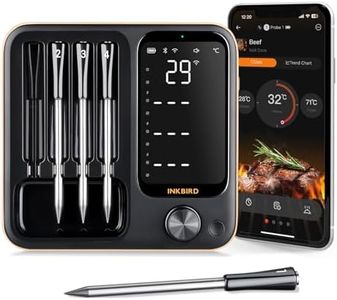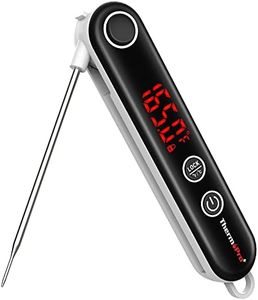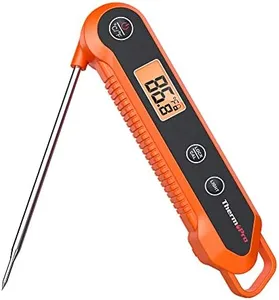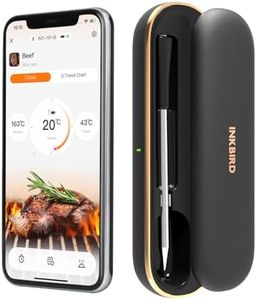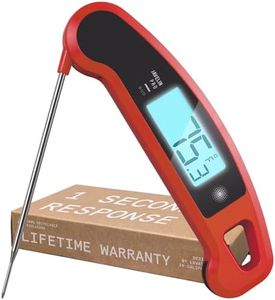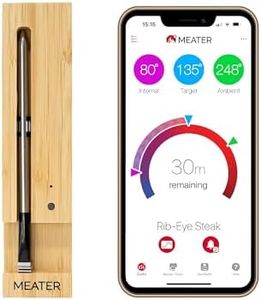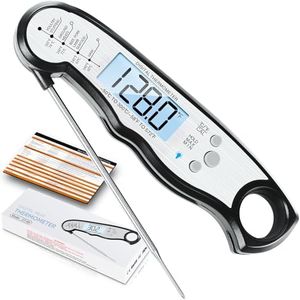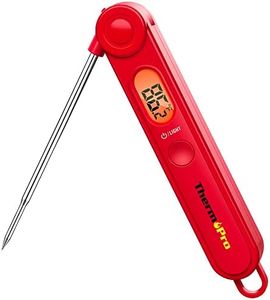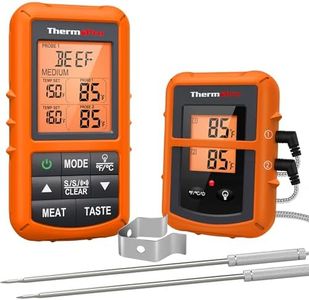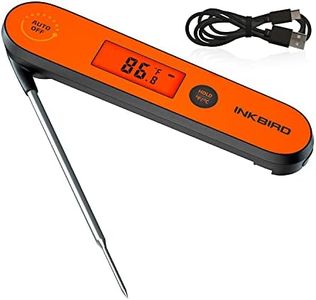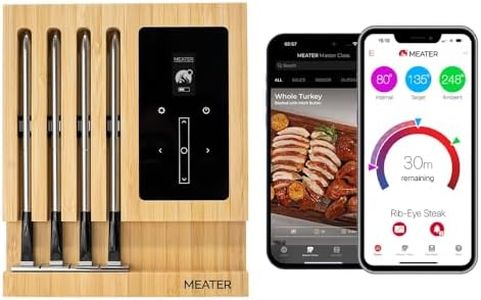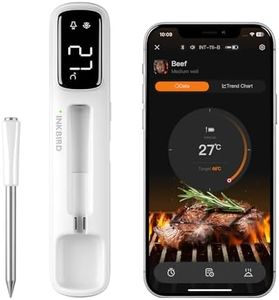We Use CookiesWe use cookies to enhance the security, performance,
functionality and for analytical and promotional activities. By continuing to browse this site you
are agreeing to our privacy policy
10 Best Bbq Thermometers
From leading brands and best sellers available on the web.By clicking on a link to a third party's website, log data is shared with that third party.
Buying Guide for the Best Bbq Thermometers
When shopping for a BBQ thermometer, it's important to think about how you'll use the device and what kind of grilling or smoking you do most often. BBQ thermometers help ensure your food reaches the perfect doneness, prevent undercooking, and make your grilling results more consistent. Finding the right thermometer comes down to knowing which features truly matter for your setup, your cooking style, and how hands-on you want to be during the process.Type (Instant-Read vs. Probe/Thermometer)The type of BBQ thermometer is about how the tool is used. Instant-read thermometers are typically handheld and measure temperature quickly when inserted into food, requiring you to open the grill to take a reading. Probe thermometers, on the other hand, can be left inside the meat with a cable connecting to the display or transmitter outside the grill, allowing you to monitor temperature continuously without lifting the lid. Choose an instant-read thermometer for quick spot-checks and versatility, or a probe style for longer cooks like smoking and slow roasting when you want to monitor progress without interfering with the cooking process.
Temperature RangeThe temperature range tells you how hot or cold a thermometer can measure. For BBQ use, it's important that your thermometer can at least handle both higher temperatures for searing or grilling (think 400–600°F) and lower ones for smoking (sometimes as low as 150°F). Some thermometers are even able to monitor grill or smoker ambient temperature. If you primarily grill steaks and burgers, a moderate upper range is fine, but for smoking and roasting large cuts, make sure your thermometer can handle both ends of the spectrum to suit all your cooking styles.
Accuracy and Response TimeAccuracy refers to how close the thermometer’s reading is to the actual temperature, and response time is how fast it gives a stable reading. High accuracy (usually within 1–2 degrees) ensures your meat is truly safe and at the doneness you want, while a fast response time (3–6 seconds) means you aren’t waiting with your grill open and losing heat. Go for the best combination of speed and accuracy you can find, especially if you frequently check temperatures or cook delicate foods where precision matters.
Number of Probes or ChannelsSome BBQ thermometers let you monitor several foods (or both food and grill air temperature) at once using multiple probes or channels. More probes can be helpful if you often cook for groups or different types of meat simultaneously, as each probe can track a separate item. If you usually cook one thing at a time, a single or dual-probe device will likely be plenty.
Display and ReadabilityThe display is where you see the temperature and sometimes other information like timers or alarms. Larger, backlit, or high-contrast displays are easier to read in daylight, at night, or through grill smoke. Some models also offer rotating screens or large numbers for better visibility. If your BBQ setup is often outdoors in bright sun or dim conditions, or if you want updates at a glance, pay special attention to display quality.
Connectivity (Wired vs. Wireless vs. Smart Features)Connectivity is about how the thermometer communicates with you. Wired thermometers are reliable but require you to be close to the grill. Wireless thermometers use radio signals or Bluetooth/Wi-Fi to send readings to a remote display or your phone, letting you monitor progress from a distance. If you like multitasking or want notifications when food is ready, wireless options with smart features (like temperature alarms or cooking apps) may fit your needs better. For hands-on, short cooks, a simple wired solution might be enough.
Build Quality and Water ResistanceBBQ thermometers are often exposed to heat, grease, and moisture. Build quality refers to how sturdy and durable the unit is, while water resistance means it can handle splashes, rain, or even an accidental drop in the sink. If you grill outside in all weather or want a tool that will last, choose a thermometer with a reputation for durability and some level of water resistance.
Extra Features (Timers, Alarms, Preset Temperatures)Some thermometers come with additional features like built-in timers, alarms when food reaches set temperatures, or preset doneness levels for different meats. These can help simplify cooking and add convenience. If you’re new to BBQ or want reminders and extra help, these features can make the process smoother. More experienced cooks may not need as many bells and whistles.
